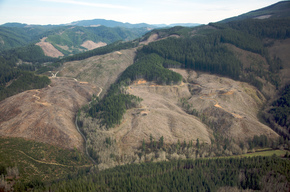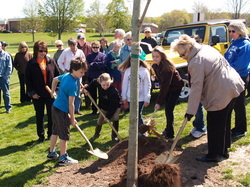 Clear-cutting and its effect on a mountainside.
Clear-cutting and its effect on a mountainside. Those environmentally damaging theologies are based on a literal interpretation of the creation story in the book of Genesis, the first book in the Jewish and Christian scriptures. This ancient story talks about how the world came into being, the place of God in it, the place of humanity in it, and the relationship between those three things - Creator, created, and creation.
Two things. First, there are actually two creation stories in Genesis. Scholars pretty much agree that these two distinct stories about how the world was created came from two different oral traditions, with two different theologies, or sets of beliefs about God. These two stories were probably stuck together during the time when Jewish leaders were in exile in Babylon, in the seventh century BC. Second, neither story was meant to be taken literally. Thought they are poetry or myth - not scientific description - they do poetically foster ideas about our place our creation.
The first story is probably the most familiar - the world is created in six days by God “speaking” things into being. You know, “God said ‘Let there be light’ and there was light.'” Scholars call this source of the Jewish scriptures the “priestly” source. It depicts a God of great majesty and power whose very words can create physical things, in fact the whole universe. This is a transcendent, ruling God who holds and exercises power over all of creation.
In this first Creation story, God creates the first human beings, Adam and Eve in God’s image. They are next down in that hierarchy the priestly source likes so much. God dominates all of creation, so you can guess what that sets up for human beings made in God's image. Genesis 1:28 says, “God said to them, ‘Be fruitful and multiply, and fill the earth and subdue it; and have dominion over the fish of the sea and over the birds of the air and over every living thing that moves upon the earth.’” You can see how a literal interpretation of this single verse might lead to trouble.
And of course that’s just what some Christians have done. They have seen the earth and its resources as ours to exploit - including hunting animals to extinction and driving the world, so to speak, into the ground. They have seen the world and all that’s in it as our birthright. This theology has contributed to environmental devastation and the mess we have to deal with right now. They have used religious language to justify greed.
However, this is just one interpretation of that verse from Genesis. While there’s no arguing that the Hebrew word means “to tame or to rule” it’s important to consider how the word is used in other places in scripture. The scriptures use that word to portray a good ruler. A good ruler is not someone who exploits, who destroys.
Psalm 72: 12-14 sets the example of a good ruler, “For he delivers the needy when they call, the poor and those who have no helper. He has pity on the weak and the needy, and saves the lives of the needy. From oppression and violence he redeems their life; and precious is their blood in his sight.”
In the first Creation story God rested on the seventh day. In the Jewish religion this gives rise to practices around the Sabbath, a word that means “Seventh.” Jewish people are asked to rest on the sabbath, a wonderful spiritual practice. However, it wasn’t just people who were supposed to rest on the Sabbath, but also the work animals like oxen. All of creation was meant to rest one day out of seven. What's more, Jewish laws based on that part of the first creation story are about how to manage the land, and how to make sure that all people had enough.
Exodus 23: 10- 11. And six years you shall sow your land, and gather in its yield 11 but the seventh year you shall let it rest and lie fallow, so that the poor of thy people may eat; and what they leave the wild animals shall eat. You shall do the same with your vineyard, and with your olive orchard.
Not only that, but every 49th year (seven times seven) was a Jubilee year, when all debts were forgiven, lands were returned to their ancestral owners, and all slaves were freed. In the Jewish tradition Sabbath laws were a way of guaranteeing that people rested, their beasts of burden rested, and that the earth rested. They were ways of guaranteeing that even the poorest of the poor would have enough.
The laws around the Sabbath make more sense if we see our relation to creation as stewardship rather than dominion - as taking responsibility for the earth, its resources, and its people. Stewardship would include letting the earth rest, treating our animals with kindness, and taking responsibility for the poorest among us.
Then I thought some more and it struck me that the root may be even more basic than that. The root might be acting as though only our own interests matter. Now this is the way things are in the wild - self interest trumps everything else, and it has to in order for each species to survive. In survival mode, we only care about ourselves and our own.
This leads me to another take on that word “dominion.” Maybe the thing we must tame and take dominion over is that wild tendency only to seek our own interests, defining those interests quite narrowly. Maybe that’s the tendency that religion should encourage us to dominate - that kind of selfishness, that narrow focus.
If religions focussed on that, things would be quite different, wouldn’t they? Instead of dominating others we would rein ourselves in. Instead of limiting the scope of our regard to a very narrow focus we could widen it to embrace all of creation, all human beings, all beings. That would encourage us to be good stewards of our relationships with one another, with all of creation, and if we believe in one, with a higher power.
One piece of good news is that many people of many religions, are doing just that. They are holding up an eco-theology, a theology of stewardship important in healing our earth. The good news is that we are not alone in our commitment to the earth and all of its creatures. We are not alone.
This story has a lot to recommend it. The God of this biblical source is an “immanent” God who lives in and shapes the world, including creating the first human being out of earth. There are lots of cute plays on words going on here - the word for “earth” in Hebrew is “adamah” and of course the first being made out of earth is called “Adam” a word related to the word "man" in Hebrew. Not only are earth and humanity related in the words of the scripture, they are made out of the same stuff. Earth to earth, ashes to ashes, dust to dust.
In the second creation story other animals are created, at first, to be companions to Adam. Adam helps name them. Since naming is portrayed as a creative act in the first creation story, you could say that in naming the animals Adam becomes a partner or even co-creator with God. Eventually the Creator realizes Adam needs an equal partner and creates one for him.
The theology of the second creation story establishes a more equal relationship between the Creator and humanity, and between humanity and creation. In its theology we are companions with the animals, partners with the divine, and part of the earth. Unitarian Universalists would say that we are part of an interdependent web of all creation. Our special part in the web is to treat it with respect, to see to its integrity, health, and vitality, including letting the earth rest.
It’s important to talk about theology on Earth Day because an important part of theology is establishing a relationship between creator, creation, and created.
If we and people in other religions embrace a theology of stewardship and responsibility, we can begin to turn things around. If we embrace a theology that suggests we are part of the earth, companions of its creatures, and partners with the creator, we can begin to turn things around. If we let the earth rest it can begin to heal itself.


 RSS Feed
RSS Feed